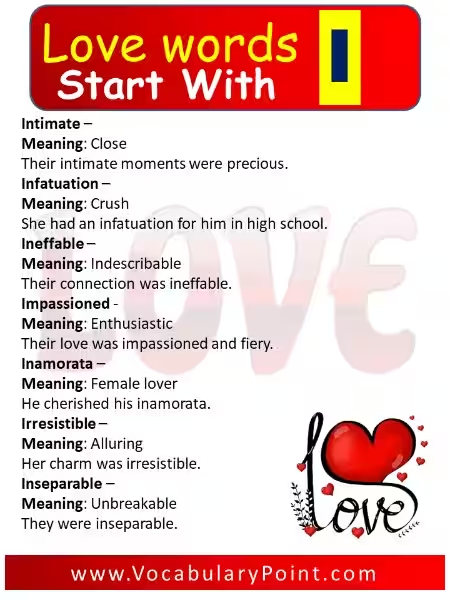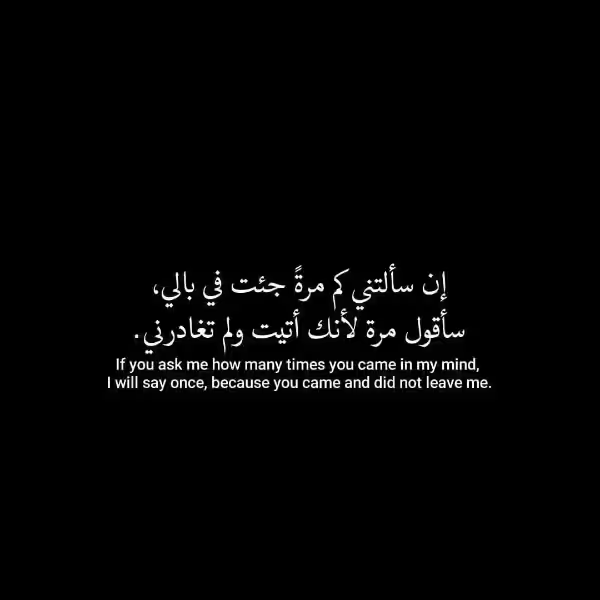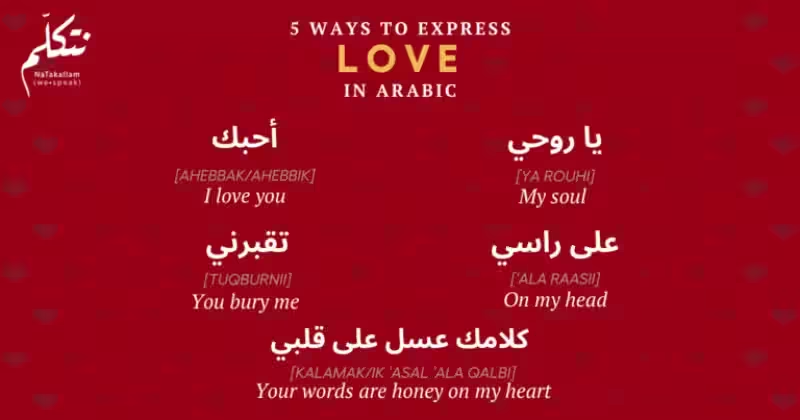
Love, in all its forms, deserves to be expressed with precision and passion. This article delves into a treasure trove of words, specifically those beginning with “I,” that can elevate your descriptions of love and romance. From the intoxicating to the inspiring, these words allow you to paint vivid pictures of the myriad emotions that intertwine with the experience of love.
Unpacking the “I” in Love
Love words beginning with “I” offer a unique perspective, often hinting at the inner workings of affection. They delve deeper than simple synonyms, inviting us to explore the subtle nuances of connection. These words aren’t just replacements for “love,” they’re building blocks for a richer, more evocative understanding of the romantic spectrum. These words reveal layers of emotion, capturing the intensity, the depth, and the subtle complexities of loving relationships. They can be used in creative writing, personal expressions, or even in everyday conversations to evoke a deeper sense of connection.
Idealization and Intensity
Ideal often conjures up the image of the perfect partner, the embodiment of dreams. We often idealize people, situations, or even entire relationships, envisioning a utopian love that may or may not exist in reality. However, the idealization of love is important, because it represents the hopeful and aspirational aspects of our romantic pursuits. Idealization is not necessarily a flaw, it’s a natural human tendency when seeking connection. It often fuels passion and desire.
Intense love, on the other hand, delves into the powerful, overwhelming emotions that can accompany romantic relationships. The intensity of love can manifest in various ways, from fierce passion to quiet devotion. Both idealization and intensity are crucial elements in the tapestry of love, shaping the narrative and experience of romantic connections.
Inspiring and Imaginative Language
Imagination plays a crucial role in passionate relationships. It’s the key to creating vivid scenarios, dreaming up future possibilities, and seeing the potential in a partner. Using words that evoke imagination allows us to paint a heartfelt picture of what love means to us.
Inspiring love, both in ourselves and in others, motivates us to grow, to overcome challenges, and to become better versions of ourselves. It encourages us to be more creative, compassionate, and expressive. It’s a love that fosters growth and helps us reach our full potential.
Intimacy and Beyond
Intimate relationships nurture trust, vulnerability, and shared experiences. But the words beginning with “I” extend beyond the intimate; they encompass a wide range of feelings and ideas.
Incomparable love, for example, speaks to the uniqueness and irreplaceable nature of a connection. It highlights the special and irreplaceable quality of the relationship, a feeling that can be hard to articulate with simple words.
Important relationships are those that contribute meaningfully to our lives. Love words like “important” highlight the significance of those connections. They remind us that love isn’t merely an emotion, but a defining influence on our existence.
A Deeper Dive: The “I” Vocabulary
Let’s explore some specific examples of love words beginning with “I,” demonstrating the varied ways they can enrich your writing or conversation:
- Ideal: The idealized image of the perfect partner.
- Intimate: A deep and close connection.
- Imaginative: A love that thrives on shared dreams and creativity.
- Impeccable: A love that shows unwavering commitment.
- Incredible: A love that exceeds expectations.
- Illuminating: A love that reveals hidden beauty and truth.
- Incomparable: A love unique and irreplaceable.
- Insistent: A love that perseveres through challenges.
- Iridescent: A love that shimmers with a multitude of emotions.
- Incomparable: A love that stands apart from all others.
These are just a few examples of the countless words beginning with “I” that can be used to express love. The goal is to use these words in creative ways that resonate with the reader or listener.
Applying Your “I” Vocabulary
The “I” words, as a subset of the vast landscape of romantic vocabulary, are just the start of a journey to enrich your understanding and expression of love. This exploration encourages the use of a rich lexicon, demonstrating the diversity of feelings associated with romanticism. Remember to use these words thoughtfully, allowing them to add depth and nuance to your descriptions of love, rather than simply adding flowery language.
This broadened vocabulary can be used across various contexts, from personal journaling to creative writing. Whether you’re crafting a love letter, writing a novel, or simply describing a special connection in everyday conversation, these “I” words can add a layer of complexity and richness to your communication. The key is to use them authentically, ensuring they reflect the unique and powerful experience of love in all its forms.
By understanding the various shades of meaning these words convey, you can effectively communicate the depth and complexity of the emotions surrounding love, leaving a lasting impact on your readers and listeners.
Frequently Asked Questions about Love Words Starting with “I”
What is the purpose of this list of “love” words starting with “I”?
This list aims to provide a broader range of terms related to romance, going beyond simple synonyms. It helps users build a more nuanced understanding of the romantic spectrum by including related concepts, antonyms, and loosely associated ideas. The goal is to expand vocabulary beyond basic replacements, offering a more comprehensive toolkit for expressing romantic feelings. This is not just for finding synonyms, but for exploring the varied shades of meaning within the concept of romance.
How are the words organized in the list?
The words are organized based on their semantic relatedness to “romantic.” Words most closely associated appear at the top of the list. Users can filter by relatedness, frequency of usage (within English Wikipedia), and they can even filter for words connected to other terms (such as “intimate”). This allows for targeted vocabulary building exercises. Within each section, words are organized alphabetically for ease of use.
What is the methodology behind choosing these words?
The methodology involves sorting words based on their semantic relatedness to “romantic.” The site also emphasizes the frequency of the words in the English Wikipedia corpus, providing context for their usage. This helps users understand not just the semantic connection, but also the practical application of the terms within written language. This approach aims for a balanced mix of close and more distant connections to the concept of romance.
Why are frequency and usage in English Wikipedia important?
Frequency of usage in the English Wikipedia corpus provides valuable context for understanding how the words are used in written language. This helps users understand the practical application of each term, which goes beyond just understanding its meaning and adds depth to the understanding of how the word is used within the broader context of romantic language.
Is this list just for synonyms?
No, this list is not solely for synonyms. While some words might be synonyms, many others represent related concepts, antonyms, or even loosely associated ideas. The goal is to offer a more comprehensive vocabulary related to romance, covering various aspects and nuances of the concept.
How can I use this list?
The list can be used for various purposes, including naming projects (businesses, blogs, or pets), writing creative pieces (poems, vows, and narratives), and for developing a richer vocabulary for expressing romantic feelings.
Is there a focus on positive language?
Yes, the list emphasizes positive and romantic language, aiming to provide uplifting and constructive descriptions, rather than negative or problematic elements. The list focuses on expressing genuine affection, admiration, and love.
How can I provide feedback on this list?
User feedback is encouraged. This indicates a commitment to continuous improvement and a dynamic, evolving resource designed to be responsive to user needs.








